The First SMS! From "Merry Christmas" to the Mobile Messaging Revolution.
1992: The Birth of SMS.
On December 3, 1992, Neil Papworth, a 22-year-old British engineer, made history by sending the first SMS. The message "Merry Christmas" was sent from a computer to his colleague Richard Jarvis' Orbitel 901 mobile phone during a Vodafone Christmas party. Jarvis, impressed by the technology but puzzled by the lack of a reply button, received the message on a phone that weighed 2.1 kg – the equivalent of 12 standard iPhones.
90s - 2000s: The rise of SMS
SMS quickly became a ubiquitous method of communication. With the 160-character limit, people developed a minimalist writing style: "pt k", "nuj", "cf?" - basically, we all became poets of abbreviations.
At first, SMS was expensive, and phone keyboards required pianist-like dexterity to type quickly. The advent of the T9 system simplified things, but not without problems: many users experienced embarrassing moments when a "Hello!" turned into a bizarre message.
2010 - present: the decline of SMS and the revolution of messaging apps
With the development of the mobile internet, SMS was dethroned by apps like WhatsApp, Messenger and Telegram, which came with clear advantages:
🔹Free messages (except for the cost of the internet, of course);
🔹Emoticons and GIFs, for more animated conversations;
🔹Video and audio calls, because sometimes a "Hello, you?" is not enough.
Today, WhatsApp has almost 3 billion users, and Messenger and Telegram are solid alternatives, each with its strengths.
Early alternatives to SMS
As SMS became less and less used, instant messaging apps emerged that sought to replace the classic method of communication:
🔹KakaoTalk - With over 60 million users, it offered messages, free calls and multimedia sharing.
🔹Line - Launched in Japan after the Fukushima disaster (2011), it quickly reached 50 million users, offering voice messages and a Timeline for social updates.
🔹Kik Messenger - Offering the speed and simplicity of a modernized SMS, it has attracted nearly 30 million users.
The benefits of modern messaging
🔹Efficiency and Speed - Messages arrive instantly. No excuses!
🔹Low Cost - The Internet offers us unlimited messages, calls, and memes.
🔹Accessibility - You can write anytime, from anywhere.
🔹Advanced Security - End-to-end encryption protects your conversations.
The future of mobile messaging
🔹Artificial Intelligence (AI) - Chatbots that can answer for you.
🔹Augmented Reality and VR - Will we be able to send holograms instead of messages?
🔹Interoperability - WhatsApp, Telegram and Signal could become compatible thanks to European legislation.
🔹5G and 6G - Ultra-fast transfers, because the excuse of "I didn't get the message" is no longer valid.
From "Merry Christmas" to memes and 4K video calls, mobile messaging has evolved enormously. Whether you write SMS or send stickers on WhatsApp, the essence remains the same: fast communication brings us closer. Which app do you use most often?
Source:
https://www.vodafone.com/news/technology/25-anniversary-text-message
https://www.libertatea.ro/stiri/povestea-primului-sms-din-lume-cine-l-a-trimis-si-ce-mesaj-continea-acesta-3903625
https://stirileprotv.ro/stiri/international/povestea-primului-sms-trimis-acum-25-de-ani-primele-cuvinte-scrise.html




Comments